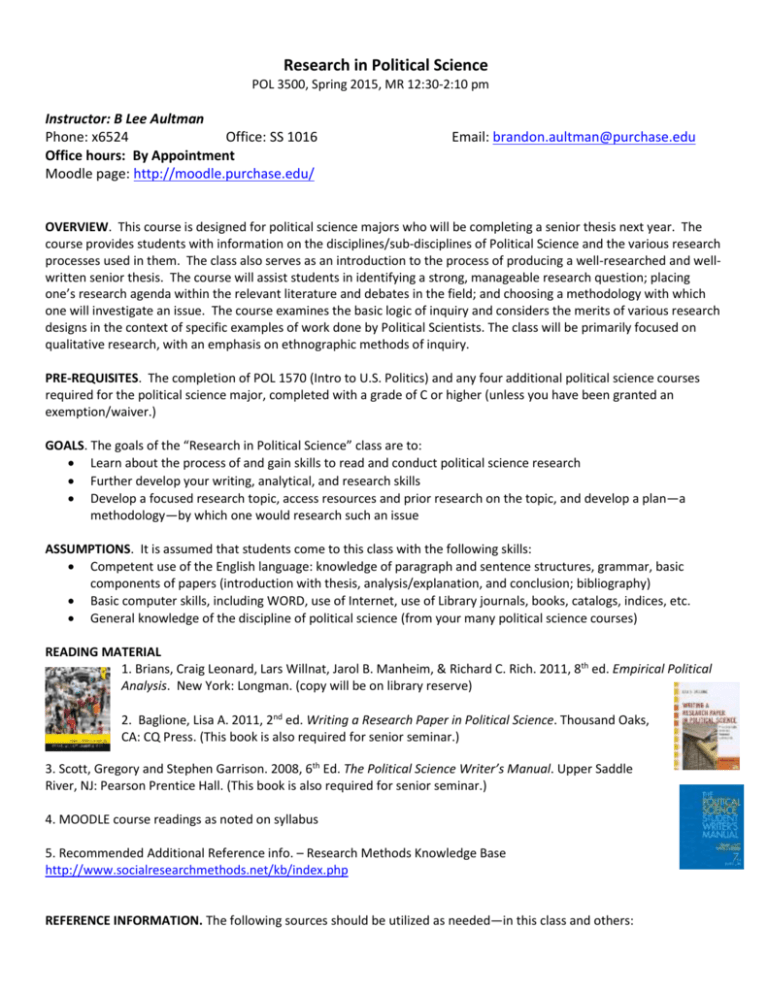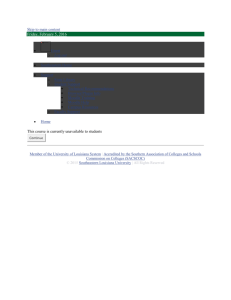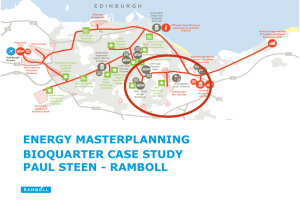
Research in Political Science
POL 3500, Spring 2015, MR 12:30-2:10 pm
Instructor: B Lee Aultman
Phone: x6524
Office: SS 1016
Office hours: By Appointment
Moodle page: http://moodle.purchase.edu/
Email: brandon.aultman@purchase.edu
OVERVIEW. This course is designed for political science majors who will be completing a senior thesis next year. The
course provides students with information on the disciplines/sub-disciplines of Political Science and the various research
processes used in them. The class also serves as an introduction to the process of producing a well-researched and wellwritten senior thesis. The course will assist students in identifying a strong, manageable research question; placing
one’s research agenda within the relevant literature and debates in the field; and choosing a methodology with which
one will investigate an issue. The course examines the basic logic of inquiry and considers the merits of various research
designs in the context of specific examples of work done by Political Scientists. The class will be primarily focused on
qualitative research, with an emphasis on ethnographic methods of inquiry.
PRE-REQUISITES. The completion of POL 1570 (Intro to U.S. Politics) and any four additional political science courses
required for the political science major, completed with a grade of C or higher (unless you have been granted an
exemption/waiver.)
GOALS. The goals of the “Research in Political Science” class are to:
Learn about the process of and gain skills to read and conduct political science research
Further develop your writing, analytical, and research skills
Develop a focused research topic, access resources and prior research on the topic, and develop a plan—a
methodology—by which one would research such an issue
ASSUMPTIONS. It is assumed that students come to this class with the following skills:
Competent use of the English language: knowledge of paragraph and sentence structures, grammar, basic
components of papers (introduction with thesis, analysis/explanation, and conclusion; bibliography)
Basic computer skills, including WORD, use of Internet, use of Library journals, books, catalogs, indices, etc.
General knowledge of the discipline of political science (from your many political science courses)
READING MATERIAL
1. Brians, Craig Leonard, Lars Willnat, Jarol B. Manheim, & Richard C. Rich. 2011, 8th ed. Empirical Political
Analysis. New York: Longman. (copy will be on library reserve)
2. Baglione, Lisa A. 2011, 2nd ed. Writing a Research Paper in Political Science. Thousand Oaks,
CA: CQ Press. (This book is also required for senior seminar.)
3. Scott, Gregory and Stephen Garrison. 2008, 6th Ed. The Political Science Writer’s Manual. Upper Saddle
River, NJ: Pearson Prentice Hall. (This book is also required for senior seminar.)
4. MOODLE course readings as noted on syllabus
5. Recommended Additional Reference info. – Research Methods Knowledge Base
http://www.socialresearchmethods.net/kb/index.php
REFERENCE INFORMATION. The following sources should be utilized as needed—in this class and others:
1. Scott & Garrison book:
Chap. 2 – Master the Basics of Language
Chap. 5 - Citing Sources
2. Internet sites for info. on citing sources (the APSA generally follows The Chicago Manual of style, 14th ed.):
APSA Documentation, University of Wisconsin-Madison http://writing.wisc.edu/Handbook/DocAPSA.html
Documenting Electronic Sources APSA Style, University of Wisconsin-Madison
http://library.stmarytx.edu/acadlib/subject/misc/eldoapsa.htm
REQUIREMENTS/GRADING FOR CLASS
This is a “hands-on” class. You are to read all assignments prior to the class for which they are assigned, and you
are expected to come to class prepared to discuss the material. There will be in-class writing assignments on many
days—sometimes over the reading, sometimes just to “freewrite” or “brainstorm,” and sometimes you will be asked to
prepare things before class. In addition, you will be asked questions in class and be expected to respond verbally “on
the spot.” These are all part of your grade of participation. THERE WILL BE NO MAKE-UP ON ANY IN-CLASS WORK. IF
YOU ARE NOT PRESENT, YOU DO NOT RECEIVE CREDIT.
No more than two absences will be tolerated without clear documentation of a family emergency or serious
illness. If such an unfortunate event occurs and you miss more than three classes, you may be asked to withdraw from
the course. You must also arrive on time and stay until the class ends; habitual lateness will also be taken into account.
Plagiarism will result in a failing grade for the course and other penalties defined by the college policy on
academic integrity, which can be accessed at http://www.purchase.edu/Policies/academicintegrity.aspx
Successful completion (C or better) of this class is required before you start your senior project. This class is
designed to provide or enhance the skills needed to successfully complete a senior project. If one does not receive at
least a “C,” one must take the class again.
NO student will pass the course—no matter what the calculation determines--if they fail to develop an
approved research topic and complete a literature review and other paper requirements as specifically listed herein.
COURSE GRADE
In-class work & Exams…………………….….50%
(attendance, preparation/participation in class discussion, quizzes, Exams, in-class writing, etc.)
Research Paper Assignments………………50%
(out-of-class assignments, including research topics, Literature Review, Introduction, Research Design, etc.)
Research Paper DUE DATES
M, Jan. 26
Potential topic for a research project this semester
TH, Feb. 12
Have an approved research topic by this date
M, March 12 Title, Introduction, and Literature Review section of your paper with Bibliography
M, April 6
(Revised) Title, Introduction, Literature review, Bibliography AND hypothesis/thesis Statement
M, April 20
Proposed research design/methodology section
M, May 11
Complete research proposal: title, intro, lit review, hypothesis/thesis statement, proposed (revised)
research design & methodology, and bibliography
TENTATIVE Course Outline
TOPIC
READING ASSIGNMENT
ASSIGNMENT DUE on this date
TH
1/22
Introduction
None
M
1/26
What might you research this
semester?
Brians chp. 1; Baglione chps. 2
—AFTER completing the reading, write
a paragraph or two on a potential
research topic you might investigate
this semester. UPLOAD on MOODLE by
the end of the day (11:59 pm), on
1/28.
TH
1/29
What is Political Science Research
. . . and what is a Research Paper?
Brians chp. 22 & 23; Baglione
chp.1;
In-class: Some of the student research
topics will be discussed. Be prepared
to discuss the stages of the research
process as exemplified in the reading
M
2/2
Overview of Political Science
Scott & Garrison Introduction
DUE: Baglione p.28-29 exercise #1 and
#2 being sure to meet the 6 checklist
items on p.29-30.
TH
2/5
“Researchable” and Researching
Topics.
Scott & Garrison App. A & chp. 5
In-class: Arrive with ONE research
topic you might research this
semester. An assignment will be
handed out in class.
M
2/9
The Scholarly Literature on your
Topic
Brians chps. 3; Baglione chp. 3;
Scott & Garrison chp. 8
MOODLE: Annotated
Bibliographies
DUE: Completed assignment handed
out in library (topic explained and 3
sources).
In-class: we will discuss assignment &
research topics.
TH
2/12
Research Questions, Theories,
and Concepts
Brians chp. 2
You must have an approved research
topic by this date.
TH
2/16
Writing a Literature Review
Baglione chap. 4; Scott & Garrison
chp. 5 (again) & 9;
MOODLE: Complete the Plagiarism
Tutorial
M
2/19
Writing a Literature Review
(cont’d)
M
2/23
Hypotheses, Theses, and
Variables
Brians chp. 2 (again);
Baglione chp. 5
TH
2/26
Thinking Ahead: Locating
aggregate quantitative data, govt.
docs., etc.
Brians chp. 11
DUE: Annotated bibliography of 5
sources on your research topic. Be
sure to utilize the checklist found on
Baglione p.54
M 3/3 DUE: Annotated bibliography of
10 sources on your research topic (5
prior –revised, replaced, etc. if
needed-- plus 5 additional sources.)
TOPIC
READING ASSIGNMENT
M
3/2
Hypotheses, Theses, and
Variables (cont’d)
MOODLE: Bernstein “Explanations
and Hypotheses”
TH
3/5
1. Writing an Introduction,
Developing a Title, and Revising
Your Work…AND
Baglione pgs. 160-165, checklist p.
170, and chp. 6
ASSIGNMENT DUE on this date
2. How does one go about
conducting research?
Research Methodology & Designs
M
3/9
Research Designs . . . cont’d
Brians chp. 4 & 6; Baglione chp. 7
TH
3/12
Operationalization &
Measurement
Brians chp. 5
M
3/16
Who or what entities will you
Study?
Brians chp. 7;
TH
3/19
Comparative Methodology
Brians chp. 12; Scott & Garrison
chp. 13
MOODLE: “Roadblocks on the Road
to Treatment: Lessons from
Barbados and Brazil.”
In-class: Groups for Mon., 3/31 class
will be organized.
M
3/23
Case Studies
MOODLE: Each group has been
assigned one article to read; the
article is on Moodle (“Readings”
tab). Also read the group
presentations assignment
(“Assignments” tab).
In-class: groups prepare
presentations. Bring the article and
the group presentations assignment to
class.
TH
3/26
Case Studies
DUE: Title, Introduction, and
Literature Review section of your
paper with Bibliography
In-class: PRESENTATIONS--student
groups will present summaries of
articles to the class (each group
presents one article)
Spring Recess: March 28 – April 5
M
4/6
Surveys and Public Opinion Polls
Brians chp. 8; Scott & Garrison chp.
20
TH
4/9
Participant Observation &
Political Ethnography
Brians chp. 19;
MOODLE: “Dispatches from the Kill
Floor” and “Introduction to Political
Ehthnography”
M
4/13
Interviewing & Focus Groups
(Possible Guest Speaker)
Brians chp. 20 & 21
DUE: Revised (as needed) Title,
Introduction, Literature review, and
Bibliography AND hypothesis/thesis
statement. (Also turn in first, graded
version of paper.)
TOPIC
READING ASSIGNMENT
TH
4/16
Content Analysis & Interpretivism
Brians chp.10; MOODLE : Soss,
“Talking our Way to Meaningful
Explanation” and Geertz, “Thick
Description: Toward an Interpretive
theory of Culture”
M
4/20
Conducting Enthnographic
Research
Moodle: Feterman
TH
4/23
Ethnography Cont.
Moodle: Feterman
M
4/27
Ethnography Cont.
Moodle: Feterman
TH
5/1
Studies in Ethnomethodology
Moodle: Coulon; Garfinkel,
Excerpts
M
4/30
Studies in Ethnomethodology
(Cont.)
Moodle: Garfinkel, Excerpts
M
5/4
Reviewing the Ethnomethods
Exercise
TH
5/7
Review
M
5/11
12 noon, Take-home Final Due at
Final exam time
ASSIGNMENT DUE on this date
DUE: Proposed research
design/methodology section. Put
your research hypothesis/thesis
statement at top of page.
Homework Exercise: Conduct Day-toDay Disruption to isolate
ethnomethods in your own life – As
described in Garfinkel
Ethnomethods exercise due
DUE: Complete research proposal:
Title, intro, lit review,
hypothesis/thesis statement,
proposed (revised) research
design/methodology, and
bibliography.










